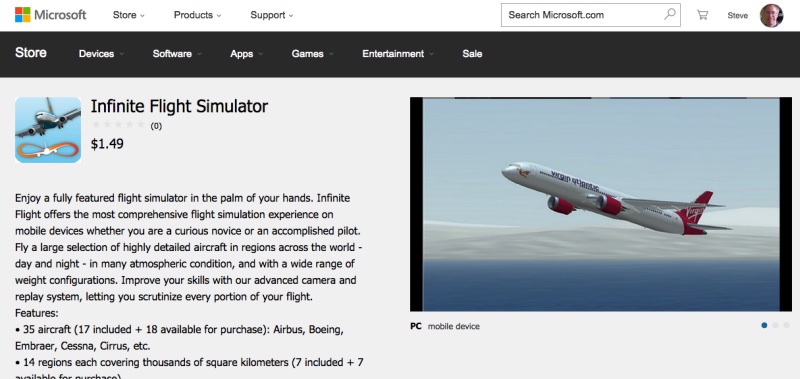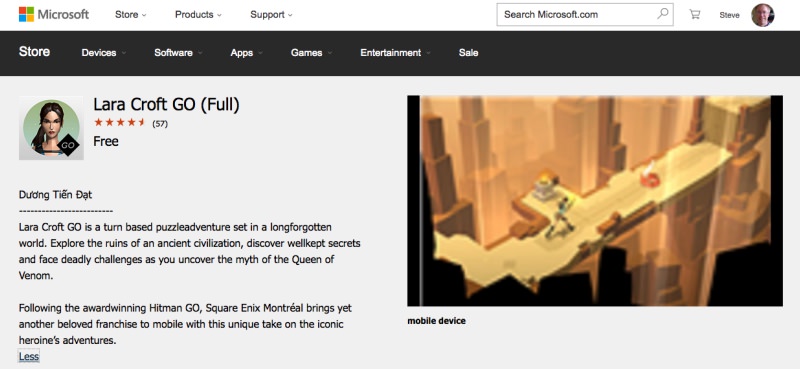This isn’t the first time I’ve had to take the Microsoft Windows Phone Store staff to task, of course. Not that they read AAWP, it seems, since things haven’t got significantly better over the years, sadly.
Take a look at these two examples, from two great games. First Infinite Flight, the classic flight simulator (see my review of the real thing):

Looks kosher, doesn’t it? But it’s not from the original developer, plus look at the number of reviews – ‘0’. Someone has re-uploaded the game under their own developer name, copied all original Store text and is pocketing the cash from any sales. Quite shocking.
Here’s another example, Lara Croft GO is brand new and featured here:

Again, totally the wrong developer/price, a poor marketing screenshot, and so on. In this case, the ‘developer’ (I use the term advisedly) is going for added, intrusive adverts, from which he hopes to make money. Harumph. Quite shocking that a) such a new game could be re-entered malevolently in the Store, and b) that no-one at Microsoft bothered to engage a brain cell to think “Hmm… didn’t we have a massive, featured, game with the same name LAST WEEK?”
The issue, as usual, is that companies want to go for bigger numbers of applications in their stores and ecosystems, no matter what the quality. This is turning round to bite Apple, Google and now Microsoft. I contend that real world users just care that the (say) 10,000 applications that they might possibly care about are present and pay precisely zero attention to the overall number in a Store, whether it’s 500,000 or 5 million. Either way, the numbers are far too large to be relevant to anyone except people making up Powerpoint slides for keynote speeches.
In fact, the more rubbish/fakes/novelties there are, the harder it is to find the genuinely good applications and games that you ‘know are in there somewhere’.
Look, stick me (or someone like me!) in an office and point me at the database of submitted applications. Time for some ‘finger in the air’ maths. I reckon, from title, developer, permissions, reviews (where relevant) and so on, that I could say ‘In’ or ‘Out’, within a minute at most, on average. So that’s 60 apps processed an hour, maybe 400 a day. By one person, with human eyes and common sense on the task in hand rather than some ‘bot’ letting everything through and humans hoping that anything nasty gets complained about. Give me a staff of 20 people and that’s 8000 a day. Or 200,000 in a month.
Heck, that means that just 20 people working hard could ‘fix’ the Microsoft Windows Phone Store in a single month! Pay them a fair wage in the USA and that’s $60,000 for all of them for the month. Which is trivial to Microsoft, it’s no more than a rounding error.
Having a Store with 50% rubbish/copies/whatever isn’t an insoluble problem. It just needs a little human attention. Which it’s not getting at the moment (witness the Lara Croft example above), despite Microsoft’s billions in the bank and those tens or hundreds of millions it’s spending on Windows 10 marketing.
Joe Belfiore, Gabe Aul, whoever’s reading this, just put human eyes on the problem. Don’t follow Google down the path of automation and relying on crowd-sourced trouble-spotting. You’re not Google and I for one would appreciate a little more of a personal touch on the ecosystem you’re trying to promote and get us all to love.
PS. Note that I have deliberately not linked to the rogue titles here – I’d hate to give them any more search engine love or steer anyone down the wrong path!!